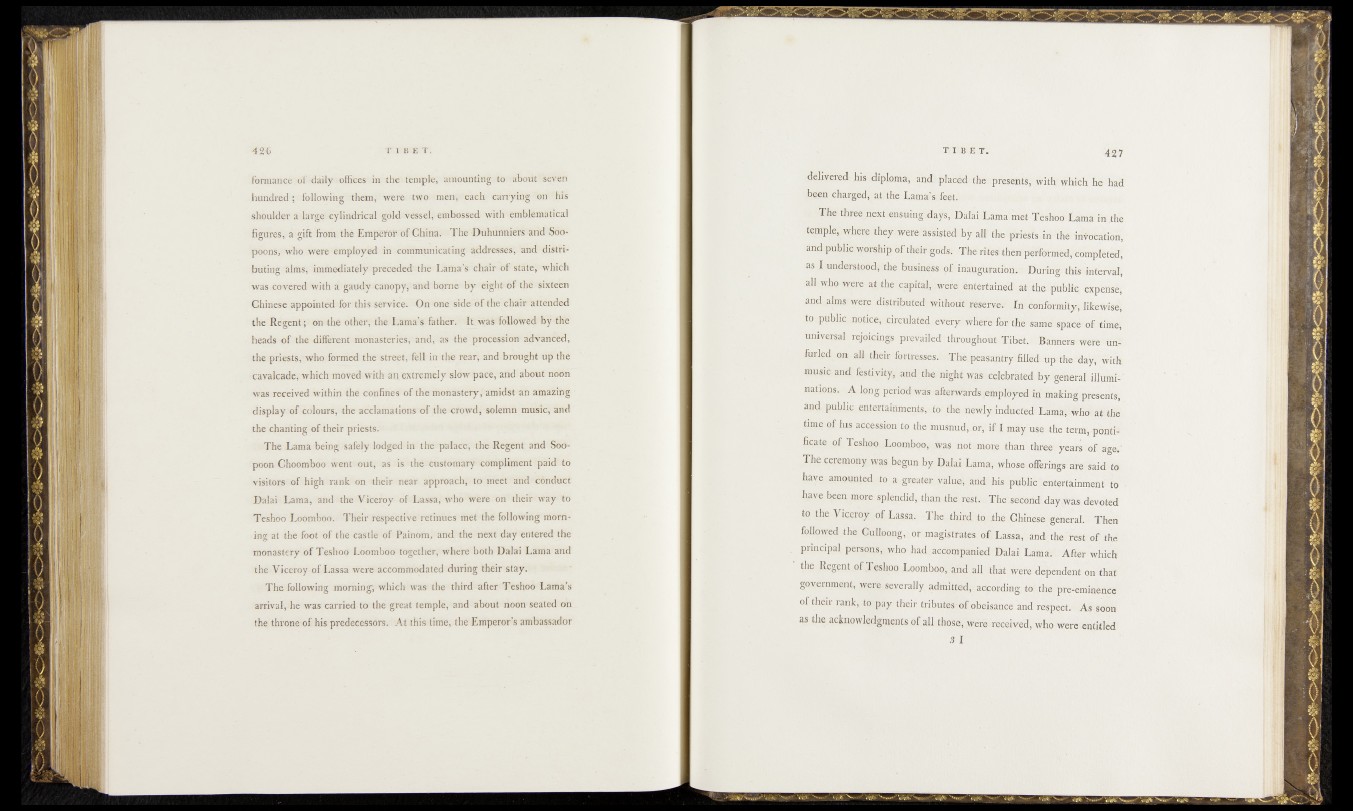
formariceTof daily^offi'cesdnthe; tempi©, amounring.to^aborit-;seven
hundred ; following them, were two men, each carrying 'ön his
shoulder a^hrrg@ cylmdrical gold-, vessel, embossed with emblematical
figure's-, é:gift from, thé Emperor of China» The DuhunniersandSóo-
pöonSj* who tweio employed in communicating addresses, and distributing
alms, immediately preceded the Lama’s chair of state, which
was covered with a gaudy canopy, and borne by eight- of the shttebn
Chinese appointed for this service. On one sideöf the chair attended
the Regent;-<nrthe other; the Lama’s father. ItwasTolfowed by tftb
heads of the different monasteries, and, as the procession advanced,
the priests, who formed the street, fell in the rear, and brought tip the
cavalcade, which moved with an extremely slow jmcè,mhd-abou#nttfa
was received within the confines of the monastery, amidst an amazing
display of colours, the acclamations of the crowd, solemn music, and
the chanting of their priests.
The Lama being safely lodged in the palace, the Regent and Sbd-
popn Choomboo went out, as is the customary- compliment paid to
visitors of high rank on their near approach, to meet and cênduct
Dalai Lama, and the Viceroy of Lassa, who were on their way to
Teshoo Loomboo. Their respective retinues met thé following morning
at the foot Of the castle of Painom, and the next day entered the
monastery of Teshoo Loomboo together, where both Dalai Lama and
the Viceroy of Lassa were accommodated during their stay. •
The following morning; which was the third after Teshoo Lama’s
arrival,-he was carried to the great temple, and about noon seated on
the throne of his predecessors. At this time, the Emperor’s ambassador
deferred;, his dipfoma.h-ah^pî^^îtWpifesénts, wifli which he had
been cha«ge#pt the:
$ H É p j ensuing|da^,lD^[£i®àma met Tèslto&Êâihÿ iU.the
tepp^whe^Ui^^ewlSiwisted '
and p h b & w h ip of t h e f e .g d d ^ ^ k ta ^ p f e ib d ; f e 0nipfete;(f,
as I undérstoèd#he businéss^pfodWa^i^éhi^.DuÆto^ùhi^teervaf,
^ h ^ o were at the .capita^ iw ere^^faiaeH -'a^fhe^M iq efrpbaséj
and^lmsrwéfe distribhtedi withoAl 'Jmàbrihmây, likewise;
tft^pubh(^^ey<mfeidated;eveEyfwKèÿefaS[ltB&ihgjspa'cé1o'Êifil^
universal., r^oidngs^re^jled throughoùfr T ib e tV l'B É t& ^ À m
%<ed- on all their forasses.’ - The peasantrylfiUhd.ùpith'eida'yf Vith
musiA-andi; festivity-, -ané-ths night wasf/.e|l^,iàtèiiî!hy3gèh'eralrilluminatjons,
A Iongr.pèrilfd was afterwhrds/jmplëydd^hvma.km^p^n^
and':ptibIiç,,entertainmentS^th- the-riev«lyâiîdùcfed Lhmai -whm at tUb
time of fos aeçess^n to the,mùsnu#ft5if may use the tem vpèfëf
ficate of Teshôô;.Loomboo, was not -more .than -three/years of age.’
The ceremony was begun by Dalai Lama^whdse. offerings’ ar&isàid to
haye amounted to a greater .value, and* hfc'i public tentertaihmeht to
have been more splendid, than-the rest, ithe^econdidayhvàs. devoted
to, the Viceroy .of Lassa. The third to the .ChineseiggnetalU Then
followed the, GuIIoong, or magistrates of Lassa, vatadr the'rest of the
principal persons, who had accompanied “Dalai'Lamàr After; which-
the Regent of Jçshoo Loomboo, and all that were dependentVbn-that'
government, were severally admitted, according,',to-hthe pre-emineheè'
of their rank, to pay their tributes-of obeisance and respect. As-soon
as the acknowledgments of.all those, were received, who were entitled
3 I ,